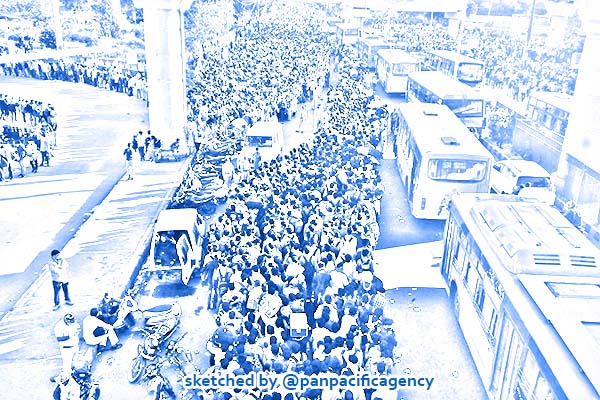Urban transportation in India to see behavioural change in aftermath of Covid-19

Migrant workers and their family members lineup outsdie the Anand Vihar bus terminal to leave for their villages during a government-imposed nationwide lockdown as a preventive measure against the COVID-19 coronavirus in New Delhi on March 28, 2020. - Tens of thousands of migrant workers and their famiies on March 28 fought and shoved their way onto buses organised by India's most populous state to get them to their home towns amid the coronavirus pandemic. (Photo by Bhuvan BAGGA / AFP). Sketched by the Pan Pacific Agency.
NEW DELHI, Nov 10, 2020, PTI. In the aftermath of the COVID-19 pandemic, India is likely to experience a behavioural change in urban mobility, said Union Housing and Urban Affairs Minister Hardeep Singh Puri, Financial Express reported.
On Monday, while speaking on the theme ‘Emerging Trends in Urban Mobility’ at the 13th Urban Mobility India Conference, the minister said the future of mobility is about striving towards eco-friendly, automated, integrated as well as personalized travel on demand. For enhanced mobility in major cities of India, new advancements, such as traffic management applications and intelligent transportation systems, are in the pipeline, the Union Minister was quoted saying in a PTI report.
The minister said, the ongoing COVID-19 pandemic crisis also presents an opportunity to guide the recovery of urban transport towards development goals that are long-termed. Both in job-creation in the present as well as boosting growth and productivity in the future, investment in infrastructure to address more effective circulation and interchange of goods and people will have an economic multiplier effect, he said. A detailed advisory has been issued by the ministry as to how the nation needs to move ahead in these testing times. According to the report, it rests on three key pillars- leveraging technological advancements, promotion of public transport system and penetration of NMT systems in the urban transport paradigm.
According to various studies, nearly 16 to 57 per cent of urban commuters are pedestrian and around 30 to 40 per cent of urban commuters use bicycles depending on the size of the city. The ministry said, considering this as an opportunity, another private vehicle alternative is available to commuters or travellers by elevating the priority of these modes. This another private vehicle alternative is safe, secured, clean as well as affordable for all. In every form of urban mobility discourse and intervention, non-motorised transport will occupy the prime, non-negotiable position, it added.